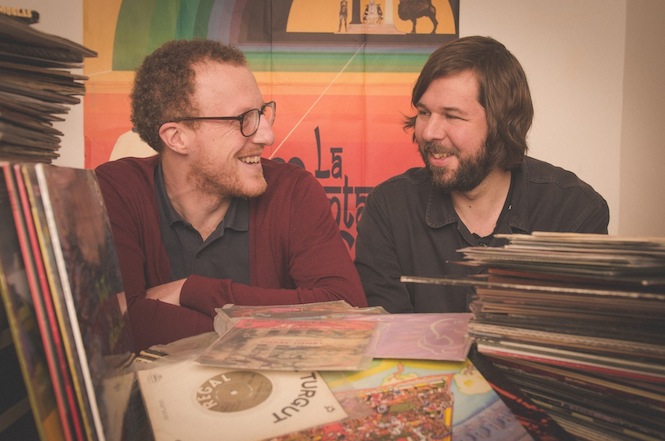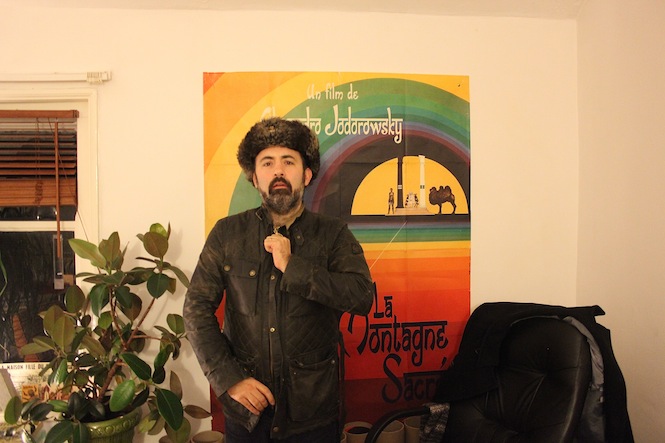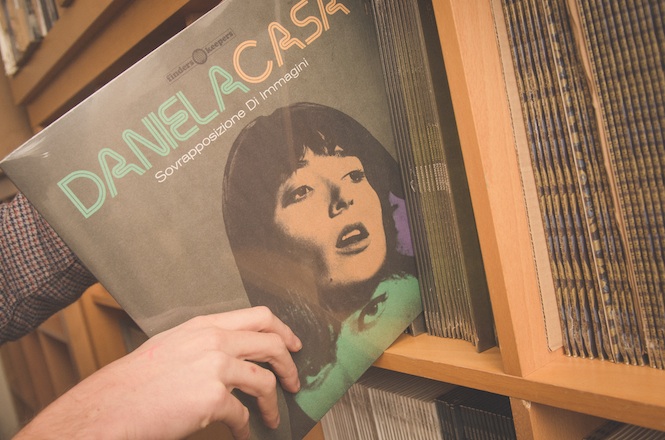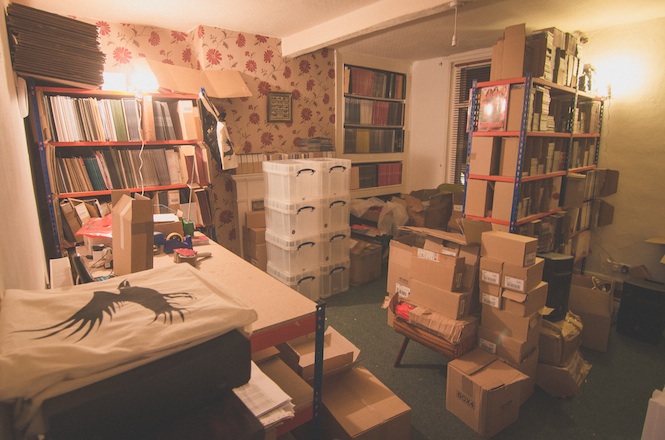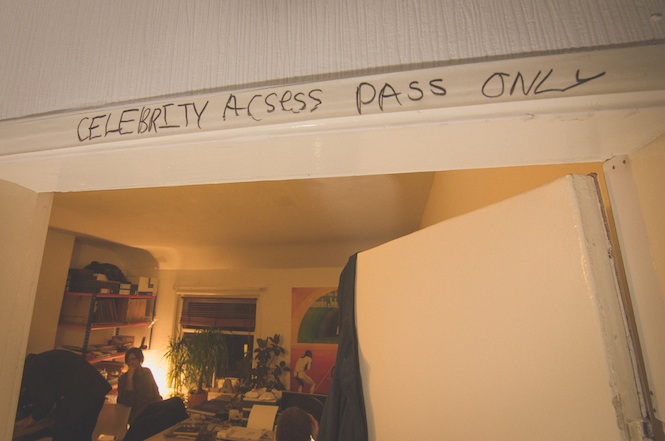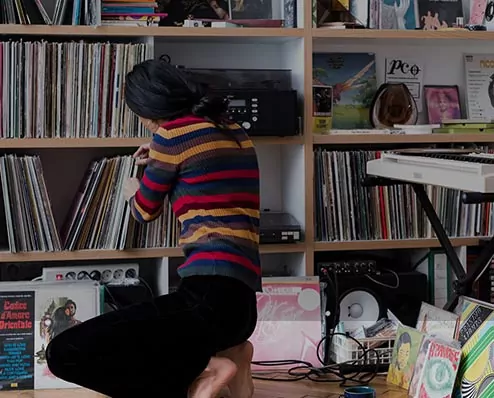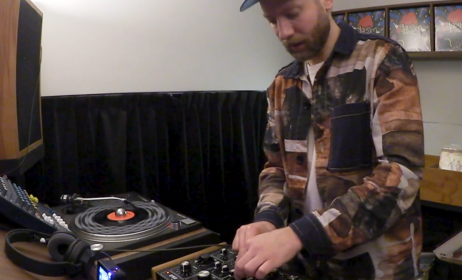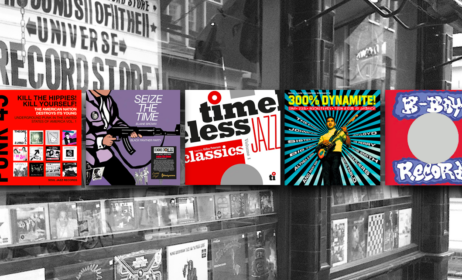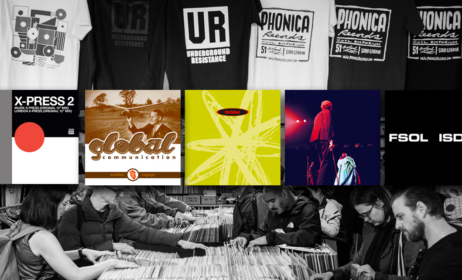Published on
June 24, 2015
Category
Features
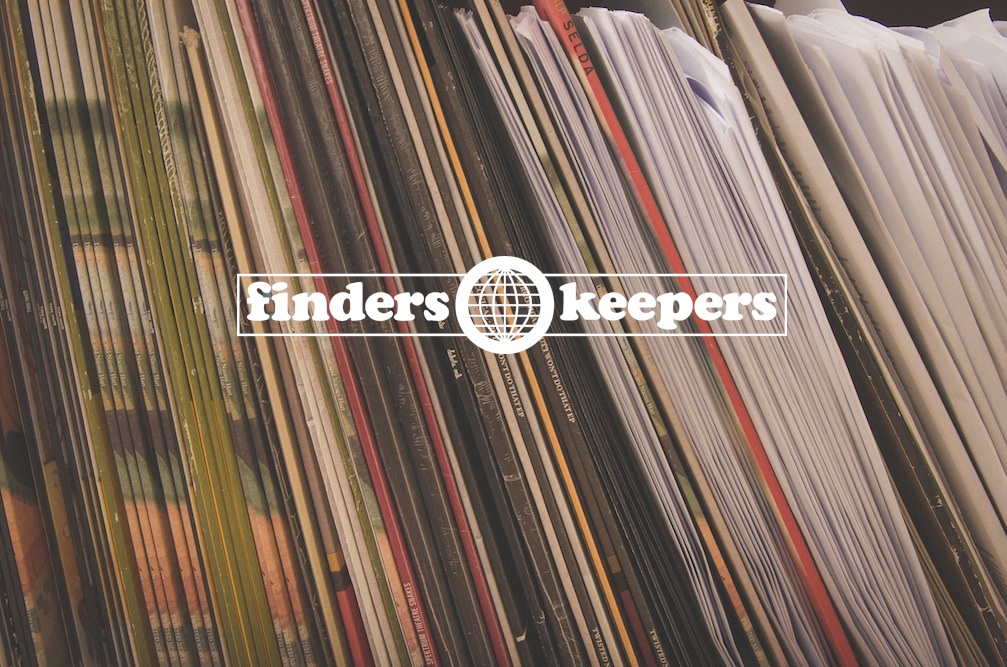
Over the last ten years Finders Keepers have pushed the art of the reissue to adventurous new realms, redefining sonic boundaries and established histories across almost 250 releases. To celebrate a decade at the front, marked by the long-awaited release of their very own grail The Holy Mountain, we sent James Hammond to spend an afternoon at FK HQ to unpick the workings of one of the most important and respected labels operating today.
Words: James Hammond / Photography: Drew McFadyen.
It’s been ten years since Finders Keepers set out their stall with a single aural oddity – the first time LP reissue of Jean Claude Vannier’s little heard yet truly extraordinary Les Enfant Assassin de Mouches. A holy grail of experimentation, extravagance in musical narrative and a wondrous cacophony of genres, it went totally against the grain both in 1972 and as an LP reissue in 2005. For Finders Keepers founders Andy Votel and Doug Shipton it was a statement of intent, a wholly worthy risk that, as Shipton puts it “nobody else at the time had the balls to work with, nobody could find a suitable home for it because it was so outrageous.” A potential one-off, instead it set the Finders Keepers world well and truly in motion – a world that over the past ten years has amassed close to 250 releases with all its sub-branches considered, and a world that is indeed still a refuge for curious sounds and like-minded musical risk takers.
With slogans such as “Breaking boundaries before breaking even” and “Making Global Music Local” the FK modus operandi has always been an intriguing one. A visit to their Marple based headquarters makes the “locality” of these extraordinary sounds all the more apparent, as you walk into a sonic treasure trove of geographically promiscuous delights, all effectively concealed by the façade of a decidedly traditional and picturesque suburban high street. In conversation with Votel, Shipton and export manager Lee Janda, the sense of camaraderie and humour amongst the self-confessed record nuts is palpable, yet clearly in tandem with how seriously they take these releases, from the re-contextualisation of false or unilluminated music histories to the fervent quest to unearth and expand upon the label’s sonic palette. As Votel puts it: “I want people to hear things they’ve never heard of. I’m not scared to go back into the past, you need as big a splatter range as possible”.
Taking its name from a suitably eclectic compilation Votel and Mark Rathbone put together for Manchester’s Fat City records, Finders Keepers arose not only from several years experience in the music business, but particularly for Votel from a growing dissatisfaction with its restrictions and mechanizations. Having cut his teeth as a designer for Fat City records he went on to set up Twisted Nerve, boasting the first Badly Drawn Boy record amongst its successes.
For Votel though as things functioned back then, the label and the industry was a glove that didn’t fit. “In the couple of years before FK started I’d tried to turn Twisted Nerve into a reissue label and I’d also set up a subscription 45 label within Twisted Nerve, as I wasn’t getting any control in my own label. It was so dogmatic working with major labels and Badly Drawn Boy and all these other things that go on, and I just thought fuck this I’m out of the game now, I don’t want to work in the music industry, I hate it. I’ve met everyone there is to meet in the industry and all its taught me is how it shouldn’t be done.”
“In a few records we’d created what was like an alternative history of music”
Meeting Shipton (initially whilst he was interning at Twisted Nerve) would prove important in changing direction. He encouraged Votel to persist with his compilations, and working on them together between Manchester and London with Shipton now at Cherry Red records, the idea of founding a reissue label on their own terms became increasingly prescient. The tipping point was when Votel began investigating the whereabouts of Jean Claude Vannier, Shipton recalls. “We went for a pint in Putney and Andy had the Vannier record with him. I wasn’t aware of it to be honest whilst being a big fan of [Serge] Gainsbourg. Andy was sniffing around Sony, BMG and other majors trying to find Vannier and there was a particular French record executive who was like ‘ah forget it you’ll never be able to get hold of this guy, he’s cantankerous and impossible to work with don’t bother’. Eventually we came to realise it was just a pure smokescreen, a front to warn Andy off this record.” Persisting and with Vannier’s lost masterpiece now firmly in mind as the first Finders Keepers release, “we ended up tracking him down, and he’s the loveliest guy – the most humble, vibrant, amazing guy you’d ever meet.”
Released to resounding critical acclaim and spawning a now legendary live performance of the record at the Barbican, the Vannier record set an important precedent for the label; that the artist could be re-contextualized and these effectively lost records could spring into a life of their own away from the conventional channels. From this mentality, other leads were chased down and the catalogue began to grow. “In a few records we’d created what was almost like an alternative history of music,” says Votel before reminding me of the fictional record store in A Clockwork Orange where a list of imaginary band names from Kubrick’s universe form the futurist top ten. “That’s what we wanted – it was like that – let’s just create a fake fictional music industry where Jean Claude Vannier is Elvis and Suzanne Ciani is like Donna Summer, and that’s how it’s become. If an alien came down and asked ‘what is music?’ and you said ‘well here’s all the Finders Keepers records’ it would be as good as playing them the Nolan sisters next to Kiki Di and Elton John because they’re all as valid.”
Having become a cherished cottage industry amongst music lovers, the “splatter range” of sounds Votel often refers back to is fleshed out amongst what has become a collective of friends, and whilst all have a very healthy love of “B-music” and the uncanny, each bring their own individual strands to the table. “Whilst its all a collaborative effort, I lean towards Spain and Brazil in our group, Doug towards the Russian bits, Sean [Canty of Demdike Stare] towards Italian bits,” says Janda. “Our interests are very similar but different at the same time, it’s an extended family.”
As a globe-scouring collective they’re often cited as the most dedicated of crate diggers, but whilst a great deal of record fair perusal is part and parcel, as with Vannier and numerous other releases, this term fails to acknowledge the dedication to tracking down the artist, uncovering lost histories and unearthing recordings that have never before been released. As Votel clarifies, “it’s important for FK to be finding master tapes and human beings. Finding human beings are what we really want to find – it’s more fun than any record. There’s not one record out there that’s not as important as the people we meet. That’s what its all about”.
Shipton adds: “I’ve lost count of how many doors I’ve knocked on looking for people, or shops in L.A that used to be label offices, and they think it’s some kind of scam when three English guys turn up asking after these forgotten labels and artists.” As such the collective appear more akin to musical sleuths than your average crate diggers, all on personal adventures of musical historicity, unraveling what has been blurred by rumour, or left out of the conventional accounts. Shipton recalls how several meetings with artists and engineers have changed his notions on the music and its maker. “Just by talking to someone everything you think you know can be tipped on its head in one evening, because again you’re dealing with so much hearsay and second hand knowledge and web based speculation. Even from those involved, stories and information can be clouded by drugs or how drunk they were… it’s a bit of a maze, a bit of a breadcrumb trail where you have to follow all the leads”.
From chance meetings in a Manchester nightclub that led to illusive Turkish folk heroine Selda’s front door, to locating long forgotten troubadour Dom Cooper via a Google then American phone directory search of his recording assistant which subsequently revealed Edwards lived only two doors down, the “give it a whirl and see if it pays off” philosophy ensures an individual story behind each Finders Keepers release. As Shipton puts it, “each record is really unique and that’s what makes it fun really. That’s what keeps it interesting. It could be sorted in a day, it could be a phone call, it could be years in the making, as with [Alejandro] Jodorowsky. It was a long, long time of back and forth and endless negotiations”.
The Jodorowsky negotiations Shipton refers to have resulted in the latest offerings from the label – three releases that flesh out the previously scant discography of the legendary Chilean film director. With the first time LP issue of the soundtrack to Jodorowsky’s 1973 masterpiece The Holy Mountain, the label has effectively come full circle, taking the span of Finders Keepers life to make happen. This was the other dream release back in 2005, and since acquiring Jodorowsky’s email it’s been a labor of love and dogged determination to pry it from former Beatles manager Allen Klein’s vaults.
“If I only had The Holy Mountain and Vannier LPs in my collection I’d be pretty happy”
Promised at the end of the film’s credits, the soundtrack never appeared, a casualty of Klein and Jodorowsky’s 40 year stand off and one of the most tantalizing no-shows in soundtrack history. Like the Vannier LP it’s a musically vast record where one sound, idea or contributor conjures all manner of other essential listening, “They’re both like blueprints for a really good record collection and a varied one as well,” says Votel. “Actually if I only had The Holy Mountain and Vannier LPs in my collection I’d be pretty happy.”
At its core The Holy Mountain soundtrack can be seen as the work of a trio – Don Cherry and his Jazz Orchestra’s ethno-spiritual marvels (fitting into a golden period of the Cherry discography), Ron Frangipane’s orchestral pop, and Jodorowky’s musical direction by way of his theatre training. Already quite the potent brew, from here the players and links branch off into a veritable garden of sound, in a breadth that covers Swedish prog, free improvisation, experimental electronics from Walter Sear’s studio, and the Ono/Lennon/Apple family link. Votel offers an educated guess that the un-credited psych rock in the soundtrack is from Apple signees Elephant’s Memory. Votel further enthuses: “Within the soundtrack there are all these first loves of mine in music, Don Cherry of course, then people that were on the Silence label within Swedish prog – Christer Bothen, and Bengt Berger, Charlie Hayden playing on it, Carla Bley compositions. None of this is credited on the film, it’s taken years to find out and understand.”
In conversation and in the liner notes, Votel’s research into the enigmatic details of The Holy Mountain soundtrack is illuminating, and it’s hard to imagine anyone outside of the players being able to connect the dots in the way he has. He recalls meeting with both Bothen and Berger to garner more information: “It was amazing to talk to someone who was actually involved in the sessions, because so much about it is unconfirmed.” Amongst anecdotes of meeting James Brown in an A & R studio lift, “he [Bothen] said in the studio he could remember Don Cherry at a piano with his cornet, with this huge film projected on the walls, and Jodorowsky hitting Cherry on the back to give him the tempo. He said that everything Jodorowsky did with music was along theatrical terms or visual terms, so it was quite a musically unorthodox scenario”.
Giving the Finders Keepers artwork treatment to a film where “every single frame is a record sleeve” was something the designer in Votel clearly relished and the resulting package is satisfying whilst carefully distanced from being a direct screen shot. “It’s important to hear the music out of the context of the films, so I think it’s important to also remove the artwork from the film a little bit with this almost comic book style.”
“The main aim with Finders Keepers is reissuing things and imagining it was that era”
It speaks of a wider attention to detail with the Finder Keepers releases, right down to the notions of the appropriate format for them. “The main aim with FK is to put things on record that were never on record, it’s reissuing things and imagining it was that era – and of course The Holy Mountain would have come out on vinyl – it’s era specific. If we were releasing some amazing music from this year there’s a chance we wouldn’t put it on vinyl, if we’re releasing a record from the ’90s we might put it on cassette. We’ve had many artists on the label who’ve said ‘oh we really want this to be on vinyl’ and you send them a test pressing and they say ‘oh we haven’t got a turntable’ – and it’s like what the fuck? It was you who wanted it on vinyl!”
Votel laughs and insists I keep this seemingly pointed reference in the account, and it’s one of several times where the resurgence in vinyl and the present reissue climate is brought up. Whilst the positives for the label are inherent, true to the label’s no bullshit philosophy there’s also a healthy amount of skepticism about the current boom. From Votel: “When we started Finders Keepers there was no competition, what we were trying to do was so single minded, and it was fucking great it was like the world was our oyster, and now we have to pull cards closer to our chests, which was not the genesis of the label. I won’t call that an occupational hazard, but it is a bit of a heartbreaker.”
In contrast to their current popularity, for Votel’s generation records were the “wrong” thing to have. They were disposable items that held the promise of hidden gold, and Votel recalls being given them as frisbees when younger. “They were trash, and the reason you had records was because none of your mates did – it was alternative and you could find crazy shit on there that wasn’t on CD. The way people are treating vinyl now it’s not an alternative culture.” He goes further: “What people are doing now is gentrifying this music, we don’t need stylistic overly explanatory new artwork, and 180g day-glo flags that scream ‘buy me’. B-music is being gentrified, the trash element – in the most popular sense of the word – has to remain. The disposable element, the underdog element, the alternative element has to remain, because they’re stripping all of that and screaming ‘buy me this is the best thing in the world’”.
“B-music is being gentrified”
Again the individual and human element of these releases is brought to the fore in contrast to all things faceless and corporate, and it brings Votel back to that other industry with scorn: “When I was working in the music industry with Badly Drawn Boy I had to go into so many expensive offices and guide people through expensive car parks and wait around and do conference calls and all that bullshit, and since that era I haven’t had to do it once with Finders Keepers. But I’ve been in a lot of people’s attics, I’ve drunk tea with two many sugars in old grandmas’ houses, I’ve ate food I didn’t want to eat, looked at a lot of photo albums, and met a lot of human beings. The major music industry kept me away from a lot of human beings, Finders Keepers has introduced me to a lot of human beings.”
“Meet your heroes, it leads to working relationships and friendships – it’s relationships that make things work,” says Shipton in concurrence with Votel. For the Finders Keepers collective, being just a fan and taking convention as gospel has never quite cut it. Long may their fictional record industry and extended family continue to laugh in the face of convention.
Click next for further listening, as suggested by Finders Keepers themselves.

